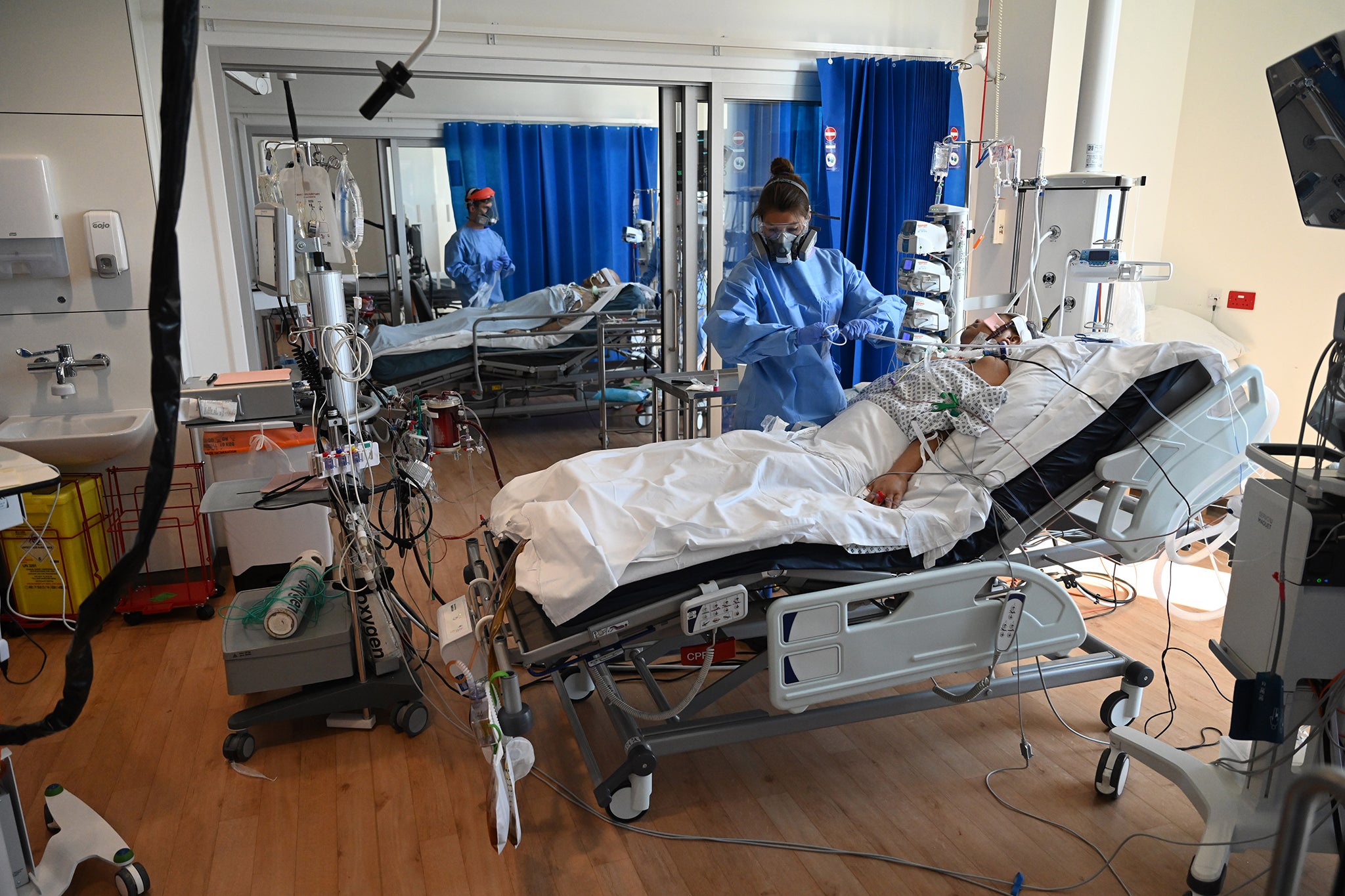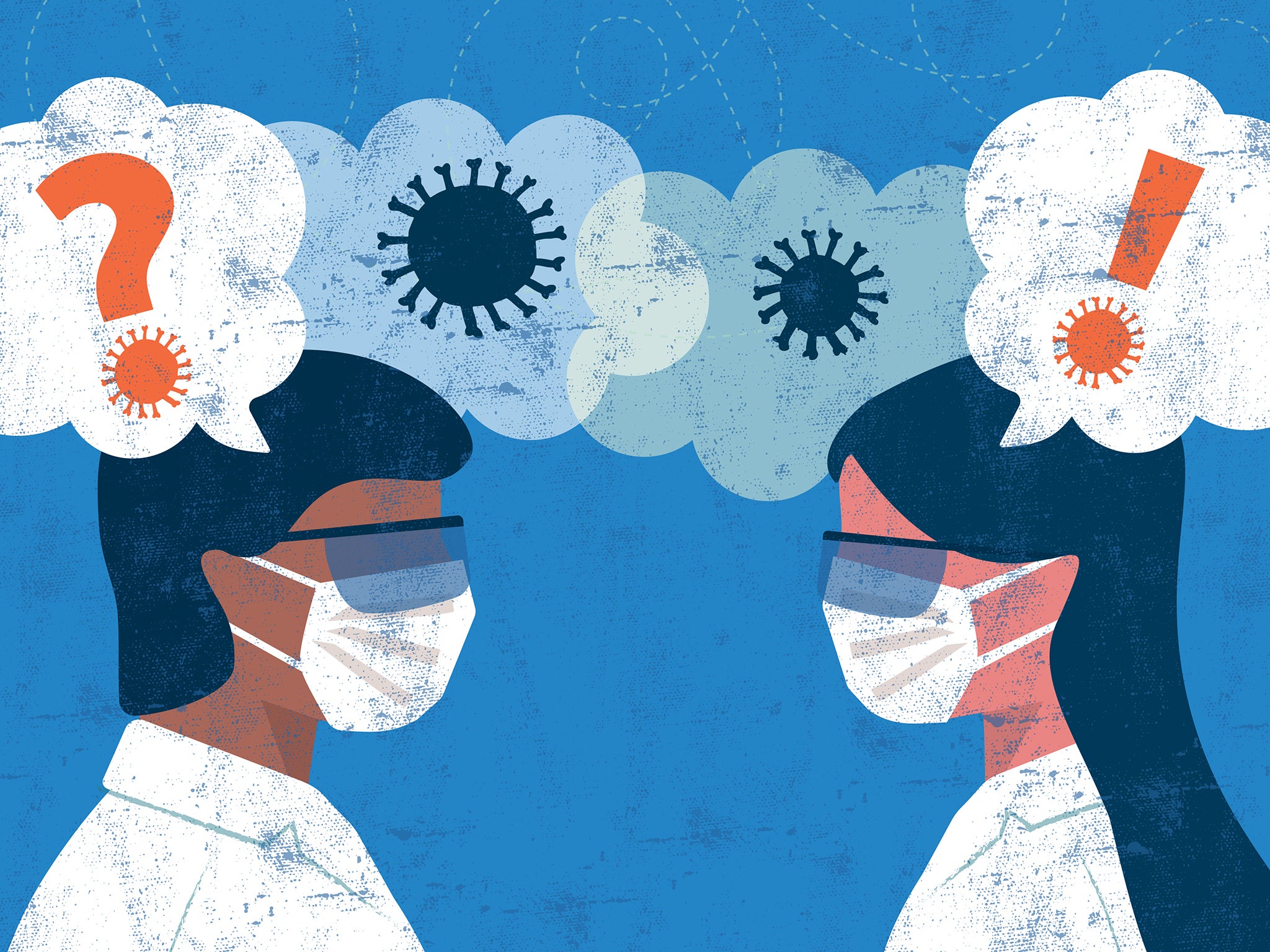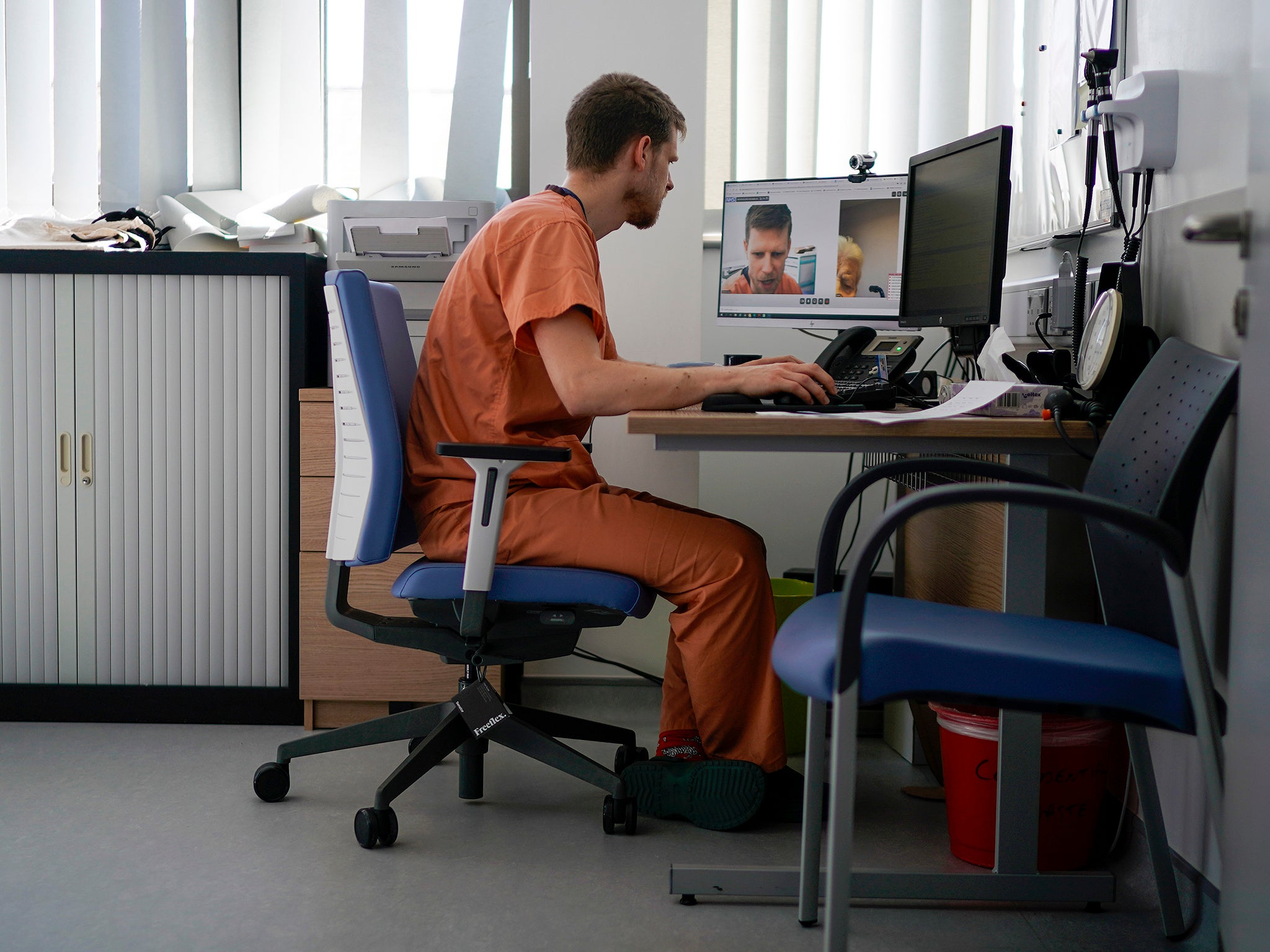Is long Covid real? And if so, could it be a bigger public-health problem than excess deaths from Covid-19
As a GP, I questioned whether long Covid was real or not. Now I know it is. But what is it, how long will it last, and why does it only affect certain people? Dr Berenice Langdon explains


Is it real?” is my first thought and then: “NICE guidance, please don’t put ideas into people’s heads,” because if people think they are going to be ill for a long time they are more likely to get ill for a long time. And then: “Well, I haven’t seen any,” when I saw the fuss made in the papers. But like Florence Nightingale – “germs; I’ve never seen one” – I was destined to be proved wrong. The next day I did see one.
A hospital physio, he caught Covid in the first wave. He wasn’t admitted and had recovered OK but now had a long list of persistent symptoms. “… Diarrhoea, shortness of breath, tiredness, loss of taste, faintness, asthma worse, chest pain, headache.” I scribble them down on my pad and then read them back to him over the phone to check I have it correct. It’s my job to try to make sense of his symptoms and consider what might be causing them.
Read More:
With tiredness symptoms, the elephant in the room is often mental health problems, but I can tell that this patient isn’t describing a mental health issue. He is a coper; he has carried on and returned to work and has set up a four-day week to manage his and his partner’s health-care work and their family.
He is not impressed when I laboriously process through all the mental health questions, but it has to be done.
Convalescence, an old idea but a real thing, has to be considered too. It takes time to recover from a severe illness. Traditionally, it was advised that for every day with a temperature, the time should be doubled before going back to normal activities. So, if you have a temperature for seven days (typical with Covid) then once your temperature has settled you should rest for a further 14 days. Convalescence is important; it allows time for recovery and it sets peoples expectations to a more realistic level.
Loss of conditioning is another consideration. As well as recovering from the actual illness we now know that for every day spent resting there is a 1 per cent loss of muscle mass. This also causes symptoms such as fatigue and has to be slowly built up again.
And what about tiredness itself? This is a common presentation in general practice and will surely account for some of the long Covids. It has lots of possible causes: medical things such as anaemia and thyroid, mental health issues such as depression and anxiety, and daily life issues such as stress at work.
Could this patient simply still be recovering from acute Covid? I have seen patients who have taken several weeks to improve. A computer programmer, diagnosed with Covid in A&E, monitored there for a day and later discharged with a pulse oximeter. She was told to keep checking her oxygen level with the pulse oximeter but it never dropped below 92 per cent.
However, when three weeks later she still had chest tightness and diarrhoea, she telephoned the practice for advice. I began to arrange weekly follow-ups over the phone and each week there was a sense of improvement. By week five she was walking a little more outside the house each day. By week six, although she was still on sick leave, she was starting to answer her work emails. At 10 weeks the diarrhoea was persistent and causing the most problem but her chest tightness was gradually improving.
When we have considered all of these possibilities, I have to take the hit. Long Covid must be real and this patient must have it
This kind of prolonged illness, with symptoms of Covid from four to 12 weeks, is now called ongoing-symptomatic Covid-19 and clearly reflects the fact that the patient in question has not recovered yet but is gradually improving. But my physio patient has had symptoms for more than four months so his profile clearly doesn’t fit ongoing-symptomatic Covid-19.
Although my patient was not treated in an intensive care unit or even admitted, many patients will have had the hardship of a long stay in intensive care intensifying their symptoms. However, it is well known that the great majority of ICU patients (85 per cent) take at least six-12 months simply to get over being in ICU based on research done in 2016, well before the Covid pandemic.
When we have considered all of these possibilities, I have to take the hit. Long Covid must be real and this patient must have it. He has already passed the first hurdle; he has had symptoms for more than 12 weeks. I arrange for him to come in for a face-to-face appointment and resolve to find out more about it in the meantime.
I start with the newly published NICE guidance Dec 2020, which uses the term Post-Covid Syndrome in place of Long Covid. This is in line, I suppose, with “post-viral syndrome”, although it’s hard to know if this term will catch on.

I would sum up the NICE guidance on long Covid as “Be nice.” It is scattered with meaningless corporate speech such as “Holistic assessment” and “person centred approach”, as if there was a way of assessing someone without being person centred. You might think NICE would be embarrassed to publish this document, or at least decide that it was perhaps too soon to write it, their reason for existing after all, is to inform clinical practice based on evidence. The evidence used to base these recommendations is, to put it nicely, weak.
The key question I want to know after asking “Is long Covid real?” is “What is it?” To start with all we have had are personal accounts of how bad it feels, written for the media and possibly played up to be eye catching. These sorts of reports give no sense of the numbers involved or how common it is among those who have had the virus.
NICE has tried its best to answer these questions. It has started with a careful literature search of more than 4,000 studies and has whittled it down to just four that are relevant to the incidence of long Covid, based in the UK, Israel and Italy. Although these were the best to be found, NICE agrees that the evidence is low quality. The numbers involved in each study are small and the follow-up short. Where the panel was hoping to see an analysis of symptom prevalence or symptom clusters, it simply sees lists of symptoms. Drawing up a list of symptoms from each paper would be easy but there is no consensus on which symptoms are the most common or which are the most important.
Consequently, this guideline (in line with others such as the CDC in America or Sign in Scotland) has a really long list of possible symptoms, which can be a signal that no one has got a clue what is going on. These symptoms cover every system in the body from neurological to psychiatric, from nose to toe. NICE does not pick out key symptoms such as cough and shortness of breath, it simply lists all 28.
Interestingly, although the term “brain fog” is constantly mentioned in news reports, this term was not reported at all in these studies. And although at least one showed 33 per cent of patients had abnormal results on a questionnaire for anxiety and depression, the patients who were on the NICE panel did not like being told that their symptoms might be due to mental health problems. They had experienced “feeling dismissed when seeking help for their symptoms, and symptoms being misattributed to psychological causes”. The panel apparently discussed that this could increase anxiety levels.

This is an unfair situation to put doctors in, to simultaneously prove that a third of patients with long Covid may have anxiety and depression (even if it is not necessarily causing their symptoms) and then tell doctors off for considering it as part of their assessment. Fortunately, NICE makes up for it in recommendation 2.1: “Take a comprehensive history of… psychiatric symptoms.”
NICE’s advice about diagnosis, “consider other diagnoses” and referral, “refer to A&E if life-threatening symptoms”, is more a lesson in ordinary clinical practice than anything Covid specific. It has the grace to finish with a list of all the things it doesn’t know (which is everything) from the risk of getting long Covid, to what to do about it.
Luckily, the Covid Symptom Study, led by Dr Claire Steves and Prof Tim Spector at King’s College London, has a section looking specifically at long Covid. Based on 4,182 (admittedly) self-reporting patients followed up for 100 days, their sample group includes patients from the UK, Sweden and US.
These patients have been hand-picked to be symptom free for at least two weeks before the onset of Covid (to enable a clear onset date) and have even been matched with a Covid-negative control group to compare symptoms. It suggests a 2.3 per cent chance of getting persistent symptoms after 12 weeks. Or to put it another way, if 50 people have confirmed Covid, one of them will get long Covid. They have even been able to analyse the results to predict who is more likely to report it; particularly older individuals, people with a raised BMI and those with asthma.
I also recommend that he take up his offer of a Covid vaccine as there has been anecdotal evidence of it helping
Professor Spector says that long Covid, “could turn out to be a bigger public-health problem than excess deaths from Covid-19”. But this data relies on patients remembering and being bothered to enter their symptoms, which is more likely to happen if the patient has had symptoms they are worried about. This is known as a recall bias.
I think these figures must be an overestimate, perhaps due to the self-reporting nature of the data. Out of our practice population, assuming a rate of infection of 17 per cent after the first wave (based on antibody testing in the community), a rate of 2.3 per cent would predict 50 patients presenting with long Covid. But I have seen one, my physio patient.

Obviously, it’s possible that other GPs have seen many more, but checking with my colleagues (and comparing notes to check we are not describing the same patient) revealed just two more, not 49, nor have there been any long Covid discharge letters from the hospital.
Ludicrously, NICE ends by blithely recommending referral to a multidisciplinary team for long Covid. Unfortunately, no such multidisciplinary clinic exists. Nice often does this and I have had to learn to see these recommendations as aspirational.
Luckily, general practice is perfectly set up to cope with long Covid-type presentations. We do it all the time anyway. Tiredness all the time is so common it has its own abbreviation: TATT. Hard to describe symptoms? GPs are the experts. Multiple problems? GP is the place to go. Symptoms that might be nothing or something? That’s for us. Recurrent symptoms? Come back any time. As long as we have someone to refer to, when the going gets tough.
Read More:
My physio patient comes in for a face-to-face appointment to check his weight, his chest and his blood pressure. Fortunately, he has no life-threatening symptoms. I help him to group the symptoms and try to make sense of them. We fix up some blood tests, just as we would for tiredness, to make sure he doesn’t have a medical cause for his symptoms and I add on a Covid antibody test too.
I focus on his chest (which sounds clear, no wheezes) and we go through asthma management advice and arrange a CXR. I also recommend that he take up his offer of a Covid vaccine as there has been anecdotal evidence of it helping. We plan another appointment for the next week to focus on the diarrhoea symptom. It will take time to sift through each problem.
Reading the NICE guidance, the lists of research papers and the countless published personal accounts has still not given me an understanding of what long Covid is. I still don’t know how long it lasts or if it will get better. But even without that information I can still look after patients with these unexplained symptoms, check them for other diagnoses and offer them support. Until we can find out more, I hope I can still be a help, even if it’s just a little bit.
Join our commenting forum
Join thought-provoking conversations, follow other Independent readers and see their replies
Comments
Bookmark popover
Removed from bookmarks